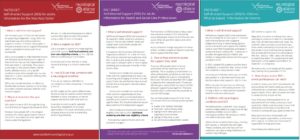New SDS factsheets for people with neurological conditions

Self Directed Support Scotland has worked with the Neurological Alliance of Scotland to create three new factsheets aimed at helping people with neurological conditions, and their carers, access self-directed support.
You can download the factsheets here:
- Self-Directed Support for adults: Information for Health and Social Care Professionals
- Self-Directed Support for adults: Information for the Voluntary Sector
- Self-Directed Support for children: What to Expect – Information for Parents
About 1 in 6 people in Scotland live with a neurological condition. Conditions of the brain and spine can cause severe impairments, and those with complex conditions can need a lot of support to undertake everyday tasks and support their independence. Many individuals and families are missing out on the opportunity to have a say in how they receive the support they need and from whom.
It is hoped these three factsheets will help address this problem. The resources will support key workers to guide people with neurological conditions to access Self-Directed Support (SDS), which is the way social care is delivered in Scotland. SDS aims to give people choice and control over their own support.
The factsheets are designed to raise awareness of SDS amongst three groups who are in a position to support people living with a neurological condition:
- health and social care professionals
- voluntary sector workers, and
- parents of children with neurological conditions
The members of the Neurological Alliance of Scotland believe that doctors, nurses and allied health professionals such as occupational therapists and physiotherapists have a vital role to play in enabling people with neurological conditions to access self-directed support. Some people with complex neurological conditions have their main link with NHS professionals and may not be in contact with social workers or the social care system. They depend on the information they get from NHS professionals to know what their options are.
Voluntary sector workers can be the first port of call for people with a new diagnosis or who care for someone recently diagnosed with a neurological condition. Many people with a neurological condition who need support haven’t heard of SDS and do not understand their rights and choices under this legislation. Voluntary sector organisations can help support individuals and families to make the choices that are right for them.
The third factsheet is aimed at parents of children with neurological conditions. Children who have additional needs related to their neurological condition are likely to be eligible for SDS, regardless of whether the child was born with a condition or it developed later.
